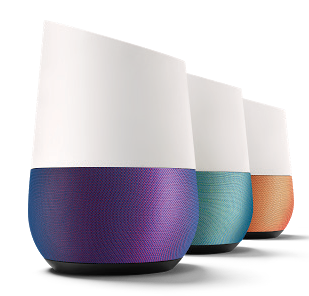By now it’s no secret that most of us who carry around smartphones in our pockets are aware that these tiny computers are smart. Some of us who own iPhones or certain devices running Android can call upon our phones to provide information, set reminders for us, make calls, send texts and do a whole lot more. While this is not exactly groundbreaking news, a handful of companies are taking voice assistants to new levels each year in the form of smart speakers.
 Google Assistant
Google Assistant
While the Google Assistant is on the latest Android smartphones, it is also a physical piece you can add to your home, and it is fittingly called, ‘Google Home.’ It comes in three sizes; the standard, mini and max, all of which feature the same functionalities but with different sized speakers and prices. Chromecast users may also find the Google Assistant especially useful as it enables more voice functions with your TV. Example: You can ask the assistant to play specific videos on Netflix, YouTube…even stream music from Spotify among others.
By far the biggest selling point that Google has over its competitors is the fact that your Google Assistant is aware of context. Asking it “Who is Cristiano Ronaldo?” will give expected results, but if you follow up right away with “Who is he married to?” it will understand and give the correct response. Asking what her height is will also produce results.
Amazon Alexa
You can find Alexa in the physical form of Amazon Echo and the much smaller Echo Dot. While the Echo’s appearance may not be as appealing to you, its two-year head start means that it’s a bit more capable as far as home control goes; turning on/off lights, opening garage doors and so on … but your mileage will vary.
 Alexa’s speakers are also powerful but they’re not the kind that you would use to drive a house party with your peers. If you’re an Amazon user, as most people probably are, you would probably enjoy Alexa’s ability to order products from Amazon using only your voice.
Alexa’s speakers are also powerful but they’re not the kind that you would use to drive a house party with your peers. If you’re an Amazon user, as most people probably are, you would probably enjoy Alexa’s ability to order products from Amazon using only your voice.
These two assistants aren’t your only options though. With Apple’s HomePod available now, you’ve got another option, although it’s USD$350 price tag is hard to justify compared to Google’s and Amazon’s price of USD$130 and USD$99 for the Standard Google Home and Amazon Echo respectively. But again, it all depends on which ecosystem you’re integrated with already, thus making Apple Homepod more appealing to Apple users.
Another reason you may opt for this Smart Speaker is its superior audio quality. It provides 360-degree surround sound and even at high volumes it doesn’t get distorted. Keep in mind that you can only connect it to Apple devices and you can’t use is with an ordinary Bluetooth speaker. There’s also a huge amount that HomePod can’t do compared to other home assistants, which is really worth looking into.
Over time software updates are sure to improve all of these assistants, and that shows promise. But no matter how much you may desire one because of how much it can simplify your day and make life much easier, this question must have popped up in your thinking at least once; “Am I ready to have an always




